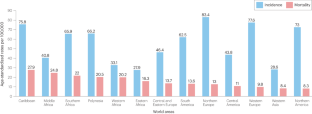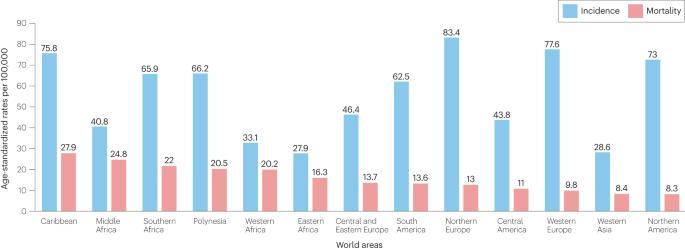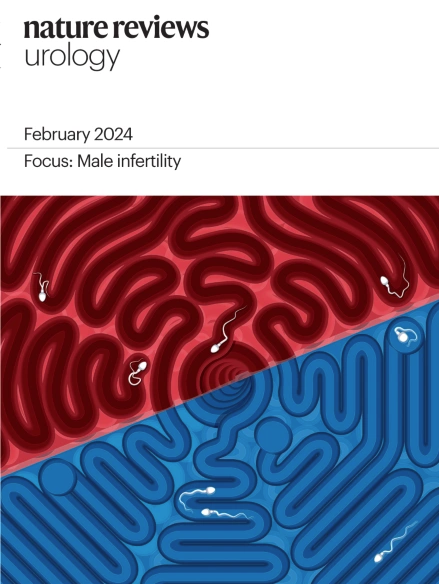影响非裔美国男性前列腺癌差异的可改变风险因素的复杂相互作用
IF 12.1
1区 医学
Q1 UROLOGY & NEPHROLOGY
引用次数: 0
摘要
在美国,前列腺癌是第二大最常见的非皮肤恶性肿瘤,也是导致男性癌症死亡的第二大原因。然而,40-60 岁非裔美国男性的死亡率几乎是欧裔美国男性的 2.5 倍。尽管筛查、诊断和治疗技术不断进步,但前列腺癌发病率和治疗效果方面的差异仍然普遍存在。导致这种结果差异的原因是复杂和多因素的。年龄和遗传易感性等已确定的不可改变的风险因素造成了这种差异;然而,有证据表明,可改变的风险因素(包括健康的社会决定因素、饮食、类固醇激素、环境和临床试验注册缺乏多样性)是造成所观察到的种族差异的突出因素。非裔美国男性前列腺癌患者在诊断、治疗和生存方面的差异还与社会经济地位低下、受教育程度低和缺乏医疗保健服务有关。前列腺癌可改变风险因素的影响和复杂的相互作用,是降低非裔美国男性前列腺癌发病率和治疗效果的重要考虑因素。本文章由计算机程序翻译,如有差异,请以英文原文为准。


The complex interplay of modifiable risk factors affecting prostate cancer disparities in African American men
Prostate cancer is the second most commonly diagnosed non-skin malignancy and the second leading cause of cancer death among men in the USA. However, the mortality rate of African American men aged 40–60 years is almost 2.5-fold greater than that of European American men. Despite screening and diagnostic and therapeutic advances, disparities in prostate cancer incidence and outcomes remain prevalent. The reasons that lead to this disparity in outcomes are complex and multifactorial. Established non-modifiable risk factors such as age and genetic predisposition contribute to this disparity; however, evidence suggests that modifiable risk factors (including social determinants of health, diet, steroid hormones, environment and lack of diversity in enrolment in clinical trials) are prominent contributing factors to the racial disparities observed. Disparities involved in the diagnosis, treatment and survival of African American men with prostate cancer have also been correlated with low socioeconomic status, education and lack of access to health care. The effects and complex interactions of prostate cancer modifiable risk factors are important considerations for mitigating the incidence and outcomes of this disease in African American men. African American men are disproportionately affected by prostate cancer in the USA. In this Review, the authors discuss the complex interplay of modifiable risk factors that might underlie the glaring prostate cancer disparities observed.
求助全文
通过发布文献求助,成功后即可免费获取论文全文。
去求助
来源期刊

Nature Reviews Urology
医学-泌尿学与肾脏学
CiteScore
12.50
自引率
2.60%
发文量
123
审稿时长
6-12 weeks
期刊介绍:
Nature Reviews Urology is part of the Nature Reviews portfolio of journals.Nature Reviews' basic, translational and clinical content is written by internationally renowned basic and clinical academics and researchers. This journal targeted readers in the biological and medical sciences, from the postgraduate level upwards, aiming to be accessible to professionals in any biological or medical discipline.
The journal features authoritative In-depth Reviews providing up-to-date information on topics within a field's history and development. Perspectives, News & Views articles, and the Research Highlights section offer topical discussions and opinions, filtering primary research from various medical journals.
Covering a wide range of subjects, including andrology, urologic oncology, and imaging, Nature Reviews provides valuable insights for practitioners, researchers, and academics within urology and related fields.
 求助内容:
求助内容: 应助结果提醒方式:
应助结果提醒方式:


